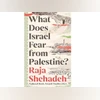What Does Israel Fear from Palestine?
Author: Raja Shehadeh
Publisher: Profile Books
Pages: 128
Price: Rs 299
“At least 100,000 Palestinians have been forcibly displaced, many not for the first time, from Deir el-Balah in the past few days, with some not even able to find space to set up tents as the Israeli military keeps shrinking the tiny Gaza Strip,” notes one of Al Jazeera’s latest reports on the war that Israel has waged on Gaza. Alongside the theatre of violence that Gaza has become, is the near-inaction of the international community.
There are any number of exceptional accounts explaining how the Israel-Palestine conflict reached this stage. But few people have been as argumentative as writer and lawyer Raja Shehadeh. The winner of the 2008 Orwell Prize, Mr Shehadeh delivered two lectures titled “The Danger or Peace: What Does Israel Fear from Palestine?” and “Does Israel Fear Peace? Reflections on the Failures of International Law and Human Rights, and on Sources of Hope” in 2016 and 2017, respectively. The former was at Ritsumeikan University, Japan, and the latter was at the School of Oriental and African Studies. His latest book —
a primer of sorts —is a revised and extended version of the two talks.
The co-founder of a human rights organisation for Palestinians, Al-Haq, Mr Shehadeh offers “new ways to think about” the Israel-Palestine conflict in this book. Divided into two parts, this brief account not only serves as a record of gross violation of the human rights of Palestinian people but is also a befitting reminder that no other actor can effectively intervene to mediate peace between the two parties.
In the first part, titled “How Did We Get Here?”, Mr Shehadeh begins by pointing out that the “late 1980s and early 1990s were a time of hope in the world.” The Berlin Wall had fallen. Apartheid in South Africa had ended.
So why, he asks, did the resolution of long-standing endemic injustices elsewhere not inspire the Israeli government to end the occupation of the Occupied Palestinian Territories, resolve outstanding issues between Palestinians and Israelis and usher in a lasting peace?
Principally, he says, there was either a lack of interest on the part of the international fraternity or it favoured Israel because doing so helped their strategic interests. Other than that, storytelling has played a crucial role in the persecution of Palestinians — a tactic that every settler-coloniser employs to hold sway over people and mobilise support.
Mr Shehadeh describes 1948, the year Israel was formed and which the Palestinians call the Nakba (catastrophe), as “year zero” in which not only did the ethnic cleansing and displacement of Palestinians take place but the “entire history of Palestine” was rewritten. Interestingly, Israel celebrates 1948 as “its war of independence” from the British but it was the latter who helped create a Jewish state. The narrative that Israel propagates is two-pronged: First, the evidence of the Jewish land in the holy Bible; second, “the sympathy in the wake of one of the worst atrocities in modern history, the Holocaust” that it leverages.
In the absence of a centralised voice against the oppression and violence that Israel was inflicting on the Palestinian population – until the Palestinian Liberation Organisation (PLO) was formed in the 1960s — the international community swallowed the fictions created by the Israelis. An example Mr Shehadeh highlights is as follows: Because the United Nations Relief and Works Agency (UNRWA), whose full name includes “for Palestinian Refugees in the Near East”, was set up to provide relief to Palestinian refugees, Israel has always tried to attack it. It “accused ten UNRWA employees of participating in the 7 October 2023 killings, leading major donors to withhold their funding to UNRWA, which provides services to nearly 6 million Palestinian refugees in three countries and in the Occupied Territories, including eastern Jerusalem.”
Alongside the political history of the Israel-Palestine conflict, Mr Shehadeh weaves in his personal history. He writes, “I remember how my grandmother, who was forced out of Jaffa in April 1948, would look at the lights on the horizon across the hills from Ramallah and believe she was looking at the lights of Jaffa.” Such references rehumanise the Palestinian struggle.
Mr Shehadeh, who has been studying “the development of Israeli legal language in the West Bank” for the last 25 years notes “how the Israeli state has been extended into the Occupied Territories through the acquisition of land and its registration in the Israel Land Authority. I have seen how large areas were defined as Israeli Regional Councils and included within Israel. How in 2003 Israel began building the Separation Wall, which was used to divide Palestinian communities and inhibit freedom of movement. How the land planning schemes were amended to favour Israeli Jews, so that one area after another became, to all intents and purposes, annexed to Israel, and our towns and villages were left as islands within those Israelis extensions, fulfilling Ariel Sharon’s promise made in the early 1980s that Israel was going to create ‘an entirely different map of the country’.”
Not only the erasure of territory but the destruction of institutes such as universities, books, and monuments is also underway. Towards the end of the book, Mr Shehadeh invokes the Palestinian poet Refaat Alareer to suggest that countering false propaganda requires people to continue to tell their story, to preserve their map. “If I must die/you must live/to tell my story. /If I must die/let it bring hope,/ let it be a tale.”
The reviewer is a Delhi-based writer and freelance journalist.
On Instagram/X: @writerly_life
Unlock 30+ premium stories daily hand-picked by our editors, across devices on browser and app.
Pick your 5 favourite companies, get a daily email with all news updates on them.
Full access to our intuitive epaper - clip, save, share articles from any device; newspaper archives from 2006.
Preferential invites to Business Standard events.
Curated newsletters on markets, personal finance, policy & politics, start-ups, technology, and more.
)